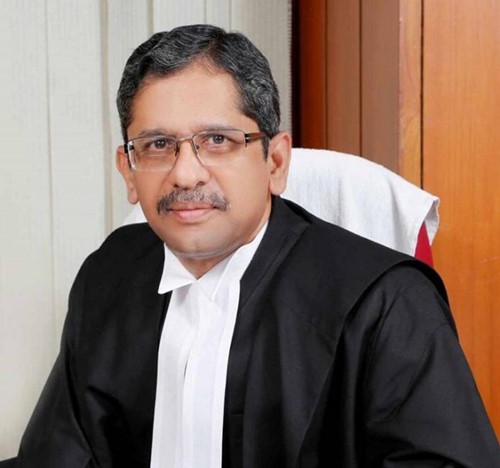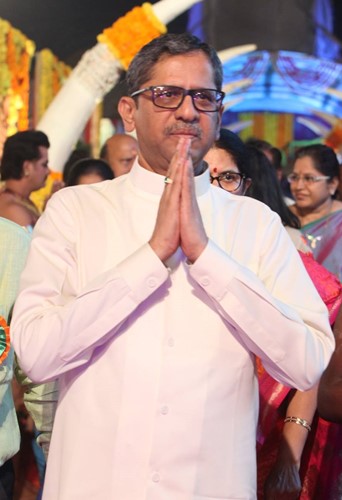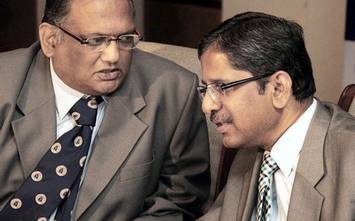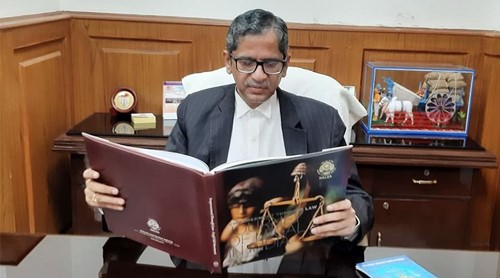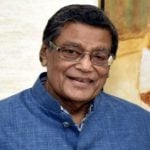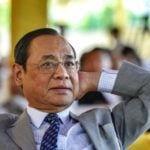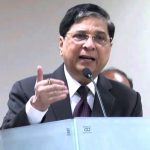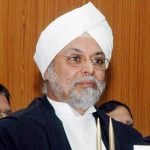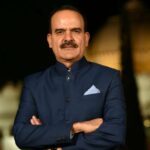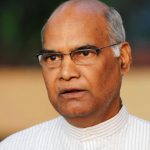N. V. Ramana Age, Wife, Children, Family, Biography & More
Quick Info→
Age: 65 Years
Hometown: Ponnavaram, Andhra Pradesh
Wife: Shivamala
| Bio/Wiki | |
|---|---|
| Full name | Nuthalapati Venkata Ramana [1]CNBC TV18 |
| Profession | Judge (Supreme Court of India) |
| Famous For | Being the 48th Chief Justice of India |
| Physical Stats & More | |
| Height (approx.) | in centimeters- 183 cm in meters- 1.83 m in feet & inches- 6’ |
| Eye Colour | Black |
| Hair Colour | Salt and pepper |
| Judicial Service | |
| Service Years | 1983-2022 |
| Major Designation(s) | • Judge of Andhra Pradesh High Court (27 June 2000 – 1 September 2013) • Acting Chief Justice of Andhra Pradesh High Court (10 March 2013 – 20 May 2013) • Chief Justice of Delhi High Court (2 September 2013 – 16 February 2014) • Judge of Supreme Court of India (17 February 2014 – 23 April 2021) • 48th Chief Justice of India (24 April 2021 - 26 August 2022) |
| Landmark Judgements | • Access to the internet is a fundamental right While delivering judgements in cases of Anuradha Bhasin and the Foundation for Media Professionals, Justice Ramana ruled that access to the internet is a fundamental right. The judgement came in the wake of the telecommunications blackout in Jammu & Kashmir after the nullification of the region’s semi-autonomous status. [2]Hindustan Times • Parameters on curfews In his judgements, Justice Ramana laid down certain parameters on curfews according to which Section 144 of the Criminal Procedure Code, which bans assemblies of over five people, should not be used to suppress the legitimate expression of opinion or grievance or exercise of any democratic rights. [3]Hindustan Times • Right to information and right to privacy are on an equal footing As part of a five-judge bench in Subash Chandra Agarwal’s case, he emphasised that the right to information and right to privacy are on an equal footing. [4]Hindustan Times • Cooperative Federalism In Swaraj Abhiyan v Union of India, Justice Ramana stressed the need for cooperative federalism in the implementation of the National Food Security Act. He observed observed that the “Government of India cannot plead helplessness in requiring State Governments to implement parliamentary laws.” [5]Deccan Herald • Disqualification under the Tenth Schedule In 2019, in a verdict related to the Karnataka assembly, Justice Ramana clarified the legal position that disqualification under the Tenth Schedule for defection could not operate as a bar for contesting elections again. [6]Hindustan Times • Right to dignity of prisoners While giving the verdict about an accused with mental illness facing the gallows, Ramana said “The right to dignity of an accused does not dry out with the judges’ ink, rather, it subsists well beyond the prison gates and operates until his last breath.” [7]Hindustan Times • Proving mental disorder While delivering the judgement in the 2020 Md. Anwar v State of NCT of Delhi case, a three-judge bench with Justice Ramana ruled that to successfully claim defence of mental unsoundness in court, the accused would have to show that they suffered from a serious mental disease or infirmity that affected his/her ability to distinguish right from wrong. The court ruled, “Mere production of photocopy of an OPD card and statement of mother on affidavit have little, if any, evidentiary value." [8]Deccan Herald • Housewives are equal to working husbands In January 2021, in a landmark judgment, Justice Ramana that a woman doing housework is no less than her husband’s office work. He also said that housewives need to be paid on the basis of services rendered by them in the house. [9]Deccan Herald |
| Personal Life | |
| Date of Birth | 27 August 1957 (Tuesday) |
| Age (as of 2022) | 65 Years |
| Birthplace | Ponnavaram, Andhra Pradesh |
| Zodiac sign | Virgo |
| Nationality | Indian |
| Hometown | Ponnavaram, Andhra Pradesh |
| University | Acharya Nagarjuna University, Guntur, Andhra Pradesh |
| Educational Qualification[10]National Legal Services Authority | • B. Sc. • Bachelor of Law |
| Controversies | • On 6 October 2020, Andhra Pradesh Chief Minister YS Jagan Mohan Reddy and his principal advisor Ajeya Kallam alleged that the second most senior judge of Supereme Court, NV Ramana had been altering the sittings of the Andhra Pradesh High Court. In response to this, Attorney General of India KK Venugopal declined the matter saying it was 'highly inappropriate' and the conduct of the CM and his advisor was wilfully disobedient. KK Venugopal also declined any proceedings against YS Jagan Mohan Reddy and his advisor, Ajeya Kallam.[11]Scroll • In September 2020, an FIR was registered against N. V. Ramana's daughters, Tanuja and Bhuvana, along with eleven other people in the office of Anti-Corruption Bureau, Guntur. The complaint stated that everyone involved had used their influence in the government to buy vast areas of lands illegally in Amaravati, Andhra Pradesh in the year 2013-2014.[12]The Wire |
| Relationships & More | |
| Marital Status | Married |
| Family | |
| Wife/Spouse | Shivamala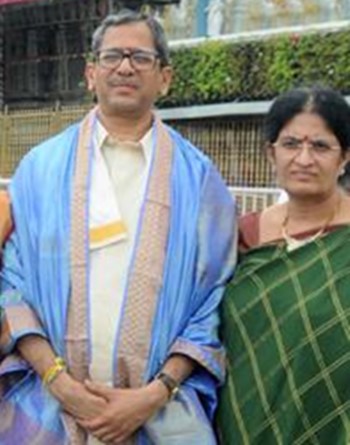 |
| Children | Daughter(s)- N.V. Tanuja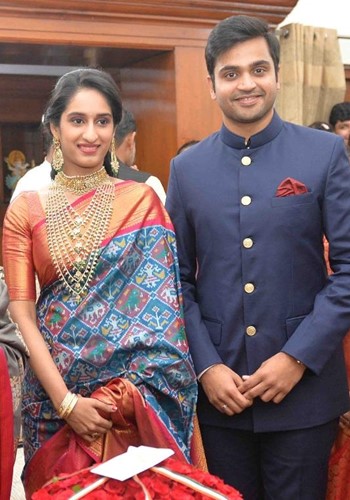 N.V. Bhuvana 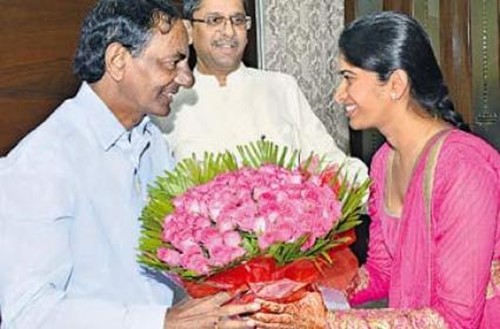 |
Some Lesser Known Facts About N. V. Ramana
- N. V. Ramana is a judge in the Supreme Court of India who became the 48th Chief Justice of India in April 2021; S. A. Bobde had recommended his name. He was appointed as the 48th Chief Justice of India by the President of India Ram Nath Kovind on 6 April 2021, and he assumed office on 24 April 2021. On 26 August 2022, he retired as the Chief Justice of India.
- He was born in an agrarian family from Ponnavaram, Andhra Pradesh. In 1975, his father asked him to move away from their home and stay with his maternal aunt as the government was planning to proclaim an emergency in the country. When he left his home, he only had Rs. 10 with him.
- He started his career as a journalist and worked for the Eenadu newspaper from 1979 to 1980. [13]Hindustan Times
- N. V. Ramana started his practice as an advocate on 10 February 1983 in the High Court of Andhra Pradesh. He has also practised in the Supreme Court of India in several matters like Civil, Criminal, Constitutional, Labour, Service, and Elections.
- N. V. Ramana also served on the panel of counsel for various government bodies. He was an Additional Standing Counsel for the Central Government. He was a part of the standing counsel for Railways in the Central Administrative Tribunal at Hyderabad.
- Justice Ramana was appointed as the permanent judge of the Andhra Pradesh High Court in June 2000. Later, he served as the Chief Justice of Delhi High Court from September 2013 and went on to become a judge of the Supreme Court from February 2014.
- While serving as a judge in the Supreme Court of India, Justice Ramana was responsible for the SC bench that dealt with matters like fast-tracking of trials in cases against legislators, and restrictions imposed in Jammu and Kashmir when Article 370 of the Constitution was being repealed. He was also part of the Bench that looked into the demand of allowing 4G mobile internet in Jammu and Kashmir.
- N. V. Ramana is a member of the General Council of the National Law School of India University, Bangalore. He is also the chairman of the Library Committee in Indian Law Institute, Delhi.
- Justice Ramana has been a part of several important decisions ranging from electoral issues to bringing the Chief Justice of India’s office within the bounds of the Right to Information (RTI). He further added-
RTI should not be used as a tool of surveillance.”
- Apart from law, N. V. Ramana has a keen interest in literature and philosophy. In his leisure time, N. V. Ramana likes to read.
- Justice N. V. Ramana was a part of the bench responsible for the judgement in the Aircel-Maxis deal case in 2017. The bench asked the public prosecutor Anand Grover to file a proper petition to urge the court to not release the properties of the Maran brothers. However, the former telecom minister, Dayanidhi Maran, his brother Kalanithi Maran, and others involved in the case were discharged by the court on 2 February 2017.
- The Rajasthan State Legal Service Authority (RSLSA) under the guidance of the National Legal Services Authority carried out the state’s first E-Lok Adalat. It was organized across the state including districts such as Barmer, Jaisalmer, Sirohi, and others. The online Lok Adalat took up more than 45,000 cases out of which about 33,476 were settled. The accomplishment ceremony was attended by Justice N. V. Ramana, Judge of the Supreme Court of India and executive chairman of the National Legal Services Authority.
Justice N V Ramana, judge, Supreme Court & Executive Chairman #NALSA appreciated the campaign. Highlights of Justice Ramana's address
➡️Merely lofty declarations in law will not satisfy requirement to uplift women who are discriminated day-in & day-out@smritiirani @MinistryWCD pic.twitter.com/16kvsOPV2O
— NCW (@NCWIndia) August 15, 2020
References/Sources:

